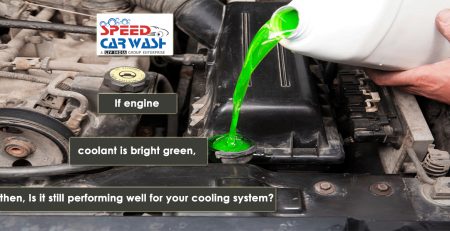6 Summer Car Care Tips to Prevent it from Breakdown
1. Cooling system
Cars have become virtually free of maintenance in the past couple of decades. The days of keeping a tab on the radiator and coolant levels have passed. Even so, your car’s engine does have an optimum temperature for getting the best performance.
Flush the radiator to rid it of any residual matter, such as rust or bits of metal that might have built up over time. Checking the coolant level is not too difficult either. You’ll find that the coolant reservoir is marked with maximum level and minimum level indicators. However, the most important thing is the viscosity of the fluid. If it’s too thin, then the coolant needs to be topped up.
It is a good idea to get the coolant replaced at least once a year. So, if the coolant in your car hasn’t been changed for a while, then doing so just before the peak of summer sets in would help keep the system running better.
Further, an important component of the cooling system is the radiator, which uses a fan to regulate the coolant temperature. Hence, keeping the fins of the radiator clean is necessary.
2. Battery
High ambient temperatures is the main cause of battery trouble. This coupled with the fact that battery trouble is the main cause for a breakdown means you’ve got to give it some attention.
The air conditioner constantly battling the summer heat and the blower fan working overtime takes a toll on the battery. So get it checked before the summer or, if you haven’t already, immediately.
Check the terminals and cables for corrosion and get these cleaned. Sulphuric acid, which usually builds up with use, corrodes the terminals and hurts the connection. This can lead to a dead battery. Further, batteries are more prone to losing electrolyte during the summer as a result of evaporation.
Since batteries don’t necessarily show overt signs of wear or damage, get it replaced if it’s four or more years old.
3. Engine oil
Apart from the cooling system, the engine oil plays an important role in protecting the engine . The oil keeps the engine lubricated and prevents wear and tear of moving parts such as the piston and the cylinder. However, over a period, engine oil loses viscosity and fine metal particles (from the moving parts) build up.
This affects lubrication and increases the heat caused by friction, damaging the engine or, in the worst case, leading to engine seizure.
Check the oil level in the engine using the dip stick and make sure to maintain the level recommended by the vehicle’s manufacturer.
You can consider switching to synthetic engine oils available in the market, which perform better than regular mineral oils. However, synthetic oils are significantly costlier than regular oil.
4. Paint
Gleaming paint looks better on a car. Everybody says so. And nothing takes away this shine as leaving your car at the mercy of the summer sun. The paint will start to fade with constant exposure and accumulating pollutants can corrode even painted surfaces.
Wash the car regularly to remove dirt and other corrosive material. ‘Pressure washing’ will remove dirt from areas that are hard to clean, such as gaps between the windscreen and the body, under the bumpers and so on.
Using rubbing wax or polish once a month can prolong the life of the paint job, and that with less than half an hour’s work.
Park the car in a shaded area whenever possible. If unavoidable, cover the car. It will reduce heat building up inside the car, which can damage the plastic bits inside. Covers are easily available and are relatively cheap.
5. Tyres
The four points of contact between a vehicle and the road, meaning the tyres if you did not guess, are very important. Maintain tyre pressure as recommended by the manufacturer. Driving on tyres with lower than optimum pressure will result in the weight of the car damaging the sidewall. In summers, it can also result in higher than normal temperatures in the tyres and lead to permanent damage.
Drastic variation in temperature between day and night can also damage tyres. The rubber expanding and contracting causes what is called ‘dry rot’ and leads to cracking of the tyre walls. Also, make sure to keep a check on if the tyres are balding.
6. Air filter
Dry weather and fast winds cause frequent dust storms in the summer, especially in the northern part of the country. This impacts the way the engine breathes. The air filter’s job is to keep the dust and grime out of the air that enters the engine. A choked air passage results in a drop in fuel economy.
The air filter also needs fairly regular maintenance if you drive on dusty and gravelly roads. Change it immediately if required. The air filter is not an expensive component to change. A clean air filter helps the car breathe better and improves mileage.








